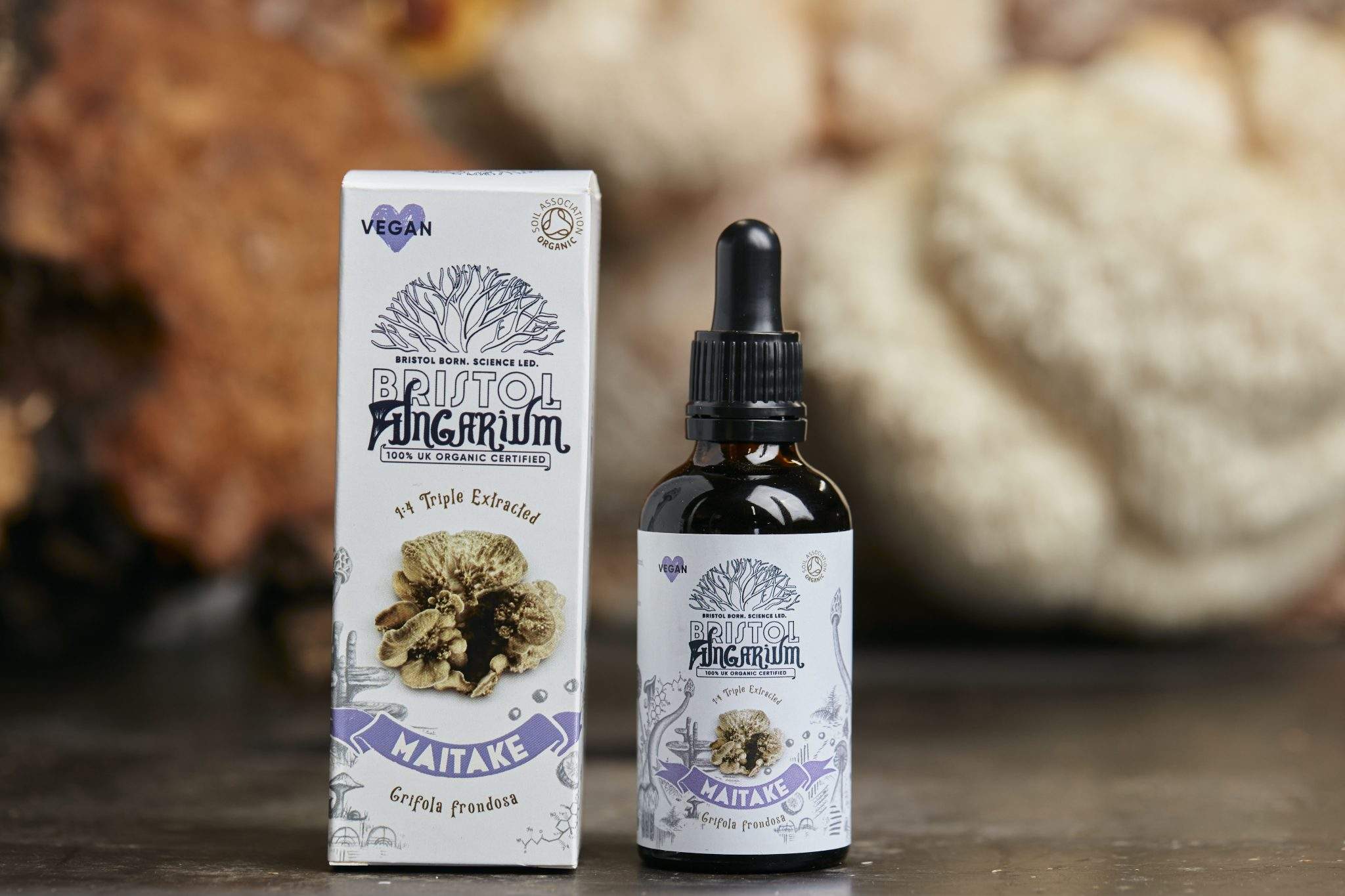Medicinal Mushrooms for a Festival Comedown
18 July 2022Unlocking the Enchanting Benefits & Powers of Chaga Mushrooms
12 January 2023Maitake & Managing Blood Glucose
A Deep Dive Into Diabetes & Beyond
Maitake translates to ‘dancing mushroom’ in Japanese; where it was so revered in ancient times that it could be exchanged with the Shogun for its weight in silver! More locally known as ‘Hen of the Woods’ Grifola frondosa, wherever in the world it’s mentioned – is not only a delicious edible mushroom, but is also highly regarded for its health benefits.
Possessing a range of intriguing medicinal properties, maitake fruiting body extracts have been trialled in multiple studies that suggest it could be a useful natural tool for managing insulin resistance, restoring hormonal imbalance [1,2,], and as a potential support for cancer regression when taken alongside chemotherapy [3,4].

Insulin resistance relates to a reduced ability of muscles, liver and fat cells to respond to insulin (responsible for a reduction in blood sugar levels and encouraging efficient fat storage). Therefore, decreasing insulin resistance – or increasing insulin sensitivity – enables cells to better respond to insulin in the blood and thus take up ‘blood sugars’, otherwise known as glucose. For context, every time we consume food, our bodies break down the carbohydrates into glucose… As changes in glucose levels are detected, insulin is produced; which signals cells to break down and/or store it, balancing our blood glucose levels. Insulin resistance describes the inability of cells to take up enough glucose, leading to an overproduction of insulin and resulting in overly high blood sugar levels [5].
With links between increased blood glucose levels and the narrowing of blood vessels due to a build-up of fatty substances, research shows that managing blood pressure could be strongly linked to managing blood sugar levels [6]. By understanding how our bodies process glucose and what factors may affect it, we can better integrate natural remedies to support its innate rhythms. This understanding may be particularly useful for people with diabetes. As one of the most common chronic diseases in the UK, diabetes affects almost 4 million people in the UK, 90% of whom have diabetes type II [7].
A handful of in vivo animal studies show this magnificent mushroom’s potential for improving blood sugar levels in rats with type I diabetes [6], and type II diabetes [8] with positive results found in diabetic animal models for both blood sugar and blood pressure [6,9]. However, it is important to note that if a person is already taking insulin, Maitake supplements should be avoided altogether, otherwise the risk of flooding the body with insulin becomes dangerously high.
Our bodies follow four biological cycles or rhythms; diurnal, circadian, ultradian and circalunar. Not only are medicinal mushrooms helpful in overall health and immune support – it is becoming clearer through decades of research into their mechanisms, how we could integrate different mushrooms into different parts of these biological cycles.
Understanding the changes that occur during our biological cycle, specifically the menstrual cycle, can give us acuity for when and how to use medicinal mushrooms more insightfully.

Menopause
Maitake could be used for the management of symptoms associated with the end of the menstrual cycle, too. Fluctuations in blood sugar could account for some of the unpleasant symptoms related to Menopause. Due to natural hormonal fluctuations stemming from adrenal and thyroid hormonal secretion, the triggering of insulin resistance can occur in women who have never experienced it before this time in their lives. As the body begins to have trouble processing high amounts of carbohydrates, symptoms such as fatigue and weight gain can occur – which could potentially be mitigated by a quality Maitake extract[11].
PCOS
With an estimation of 1 in 10 women in the UK suffering from PCOS (polycystic ovary syndrome), and a huge gap in understanding female sexual and reproductive health, the promise of maitake as a potentially valuable natural tool in supporting this common condition is worthwhile exploring. Linking to hormonal imbalances; a prominent feature of PCOS is insulin resistance [12,13]. By minimising the negative effects of oestrogen dominance and inflammation, maitake could help reduce symptoms of PCOS including weight gain and acne [14]. High levels of insulin in the body also increases testosterone production in the ovaries which can impair ovulation [14,15]. The use of maitake to support fertility is further supported by a study in Japan which found a significant increase in ovulation in women with PCOS after being given Maitake extract, with 6 of 8 women ovulating when being given maitake extract after failing to do so when being treated with clomiphene citrate (a commonly prescribed pharmaceutical medication in such instances). This highlights maitakes’ capability as a natural tool for improving fertility in cases where insulin resistance is impacting hormone balance [16].
As a lesser researched mushroom compared to the likes of Reishi & Turkey Tail, more trials into Maitake and its potential role in supporting human health in a magnitude of ways are now being conducted (but only since the 1990’s).
Incorporating this mushroom into our wellbeing repertoire could be an excellent way to manage changes and fluctuations in our bodies. Perhaps the ancients were on to something that we are only just beginning to understand through the lens of modern science.

References
Manohar, V., Talpur, N. A., Echard, B. W., Lieberman, S., & Preuss, H. G. (2002). Effects of a water-soluble extract of maitake mushroom on circulating glucose/insulin concentrations in KK mice. Diabetes, obesity & metabolism, 4(1), 43–48.
Xiao, C. et al. (2021) “Grifola frondosa GF5000 improves insulin resistance by modulation the composition of gut microbiota in Diabetic Rats,” Journal of Functional Foods, 77, p. 104313.
Kodama, N., Komuta, K., & Nanba, H. (2003). Effect of Maitake (Grifola frondosa) D-Fraction on the activation of NK cells in cancer patients. Journal of medicinal food, 6(4), 371–377.
Alonso, E. N., Ferronato, M. J., Fermento, M. E., Gandini, N. A., Romero, A. L., Guevara, J. A., Facchinetti, M. M., & Curino, A. C. (2018). Antitumoral and antimetastatic activity of Maitake D-Fraction in triple-negative breast cancer cells. Oncotarget, 9(34), 23396–23412.
Gutch, M., Kumar, S., Razi, S. M., Gupta, K. K., & Gupta, A. (2015). Assessment of insulin sensitivity/resistance. Indian journal of endocrinology and metabolism, 19(1), 160–164.
Preuss HG, Echard B, Fu J, Perricone NV, Bagchi D, Kaylor M, Zhuang C. Fraction SX of maitake mushroom favorably influences blood glucose levels and blood pressure in streptozotocin-induced diabetic rats. J Med Food. 2012 Oct;15(10):901-8. doi: 10.1089/jmf.2012.0011. Epub 2012 Aug 8. PMID: 22873755.
Diabetes UK (2019b) Diabetes Prevalence 2019. Diabetes UK http://www.diabetes.org.uk
Konno, S., Tortorelis, D. G., Fullerton, S. A., Samadi, A. A., Hettiarachchi, J., & Tazaki, H. (2001). A possible hypoglycaemic effect of maitake mushroom on Type 2 diabetic patients. Diabetic medicine : a journal of the British Diabetic Association, 18(12), 1010.
Kubo, K., Aoki, H., & Nanba, H. (1994). Anti-diabetic activity present in the fruit body of Grifola frondosa (Maitake). I. Biological & pharmaceutical bulletin, 17(8), 1106–1110.
MacGregor, K. A., Gallagher, I. J., & Moran, C. N. (2021). Relationship Between Insulin Sensitivity and Menstrual Cycle Is Modified by BMI, Fitness, and Physical Activity in NHANES. The Journal of clinical endocrinology and metabolism, 106(10), 2979–2990.
Corbould A, Kim YB, Youngren JF, Pender C, Kahn BB, Lee A, Dunaif A. Insulin resistance in the skeletal muscle of women with PCOS involves intrinsic and acquired defects in insulin signaling. Am J Physiol Endocrinol Metab. 2005 May;288(5):E1047-54.
Freeman, R. (2007) “Are blood glucose levels affected by menopause?,” Menopause, 14(3), pp. 350–351.
Teede, H., Deeks, A., & Moran, L. (2010). Polycystic ovary syndrome: a complex condition with psychological, reproductive and metabolic manifestations that impacts on health across the lifespan. BMC medicine, 8, 41.
Nestler JE, Jakubowicz DJ, de Vargas AF, Brik C, Quintero N, Medina F. Insulin stimulates testosterone biosynthesis by human thecal cells from women with polycystic ovary syndrome by activating its own receptor and using inositolglycan mediators as the signal transduction system. J Clin Endocrinol Metab. 1998 Jun;83(6):2001-5.
- Chen, J. T., Tominaga, K., Sato, Y., Anzai, H., & Matsuoka, R. (2010). Maitake mushroom (Grifola frondosa) extract induces ovulation in patients with polycystic ovary syndrome: a possible monotherapy and a combination therapy after failure with first-line clomiphene citrate. Journal of alternative and complementary medicine (New York, N.Y.), 16(12), 1295–1299.



